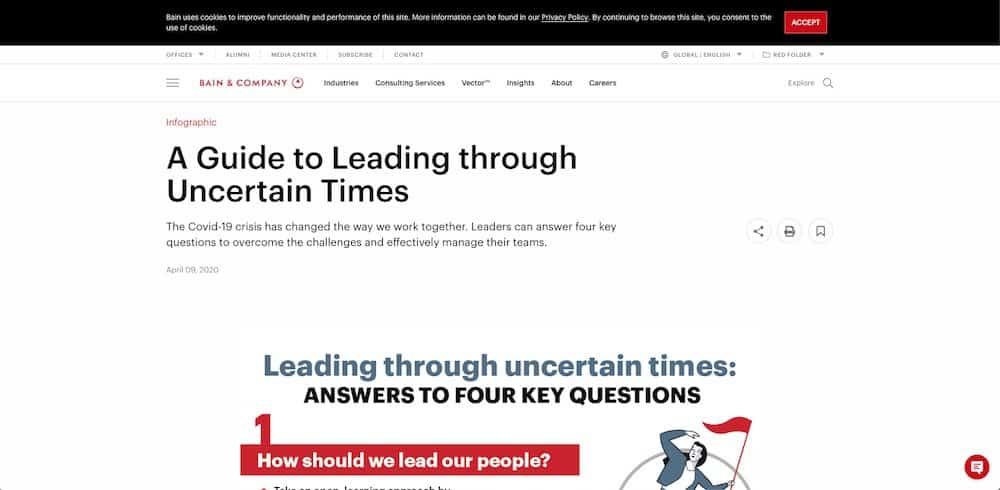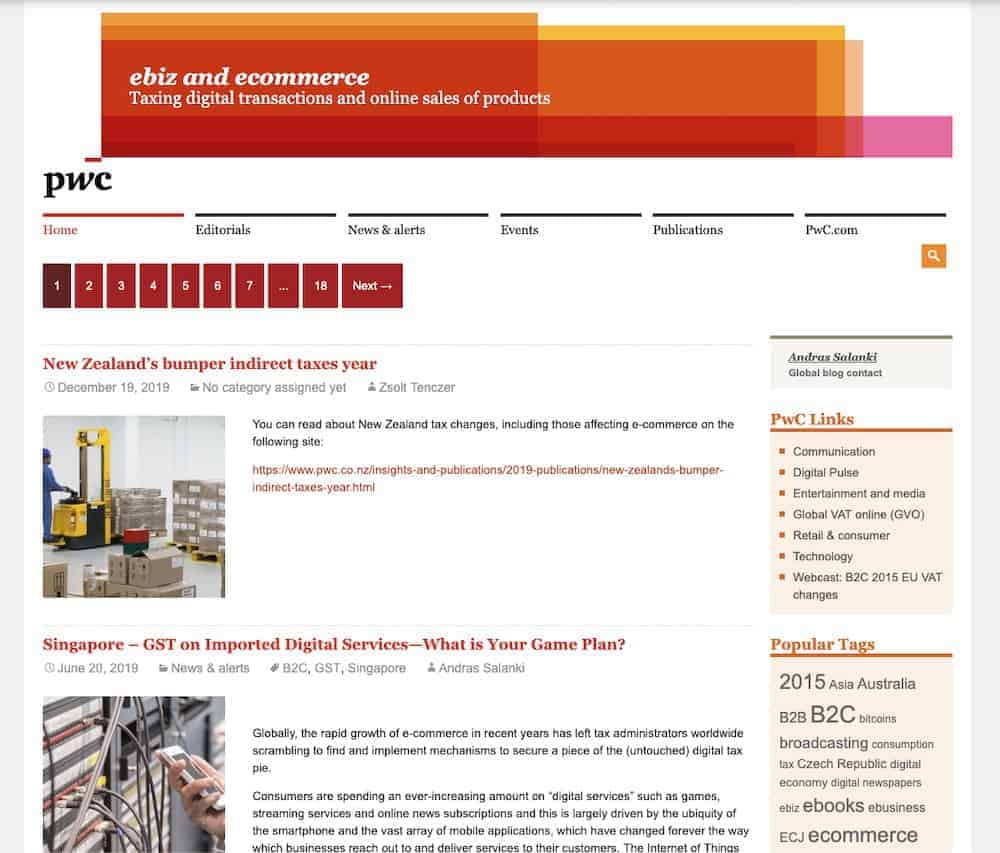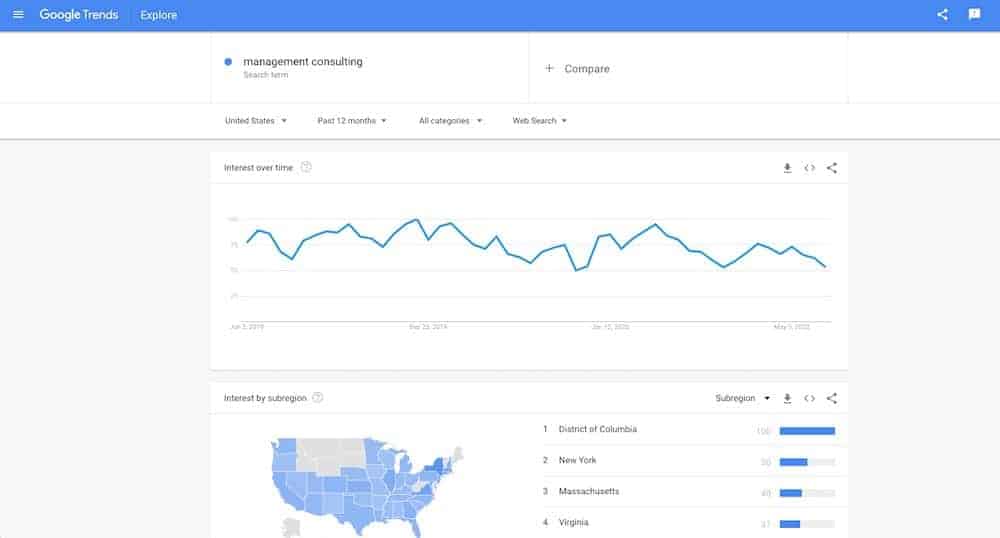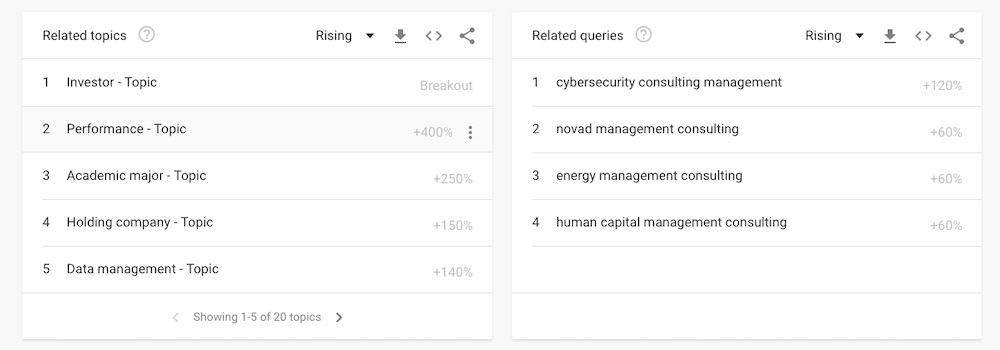
Bain & Company, Accenture, PricewaterhouseCoopers (PwC), and Boston Consulting Group—the management consulting industry is dominated by big, powerful names with reputations to boot.
These industry giants take so much market share that there usually isn’t much left for smaller consulting firms, despite the $295 billion industry market value.
Management consulting is a cutthroat business with billions involved and over 700,000 consultants in the US alone fighting to build their businesses.
If you want your consulting firm to stand out, you have to learn ways to market your services without trying to outspend the giants on paid advertising. Using content marketing to draw in organic website traffic is a great way to start—and that means a blog.
With that in mind, we put together this article on five management consulting topics for blogs and content marketing tips to help you separate your business from the rest.
- Why is blogging important for consulting companies?
- 5 blog topics for consulting companies
- Finding management consulting blog topics using Google Trends
- Finding management consulting blog topics using Google Suggest and People Also Ask
- Best practices for using consulting blogs as a marketing tool
- Need some help making your consulting blog?
Why is blogging important for management consulting companies?
There are so many reasons blogging is important for management consulting companies.
First, blogs help educate clients about the industry, your specific services, management tactics, and more. This free education builds industry exposure and trust with potential clients, not to mention the improved lead generation.
Second, blogs bring in more organic website traffic as a part of a search engine optimization (SEO) strategy and increase web traffic by targeting commonly searched queries for target audiences.
Plus, they work to increase the number of backlinks your site has. In fact, according HubSpot, companies who blog have 97% more backlinks to their sites. And a study from Backlinko of thousands of webpages found that backlinks had the highest correlation with high positions in Google.
So if you want to improve your website’s position in search results, and therefore bring in more clients, you’re going to need to start blogging.
5 blog topics for management consulting companies
Now that we know how important blogging is for a management consulting company, let’s take a look at five blog topics that every consulting blog should contain.
FAQs
FAQs are the most commonly featured type of blog across all industries because they present high value to readers looking for quick answers and allow businesses the chance to be featured in featured snippets, as well.
FAQs can be both evergreen content (content that doesn’t go out of date or has a ‘long expiration date’) or they can be more current frequently asked questions.
Here’s an example from Bain & Company who decided to create a guide to leading in uncertain times after receiving so many questions about the topic.

Guides like this help position your business as a leader that has its ear to the ground, so to speak.
Industry trends
Industry trends are an extremely valuable management consulting topic. You need to show potential clients your industry knowledge is up-to-date and you have what it takes to turn their business around, improve their leadership skills, or accomplish whatever goal you’ve set out.
No matter what industry you consult for, tech or finance or entertainment, proving your knowledge is essential. Here’s an example from industry leader, Deloitte, talking about the future of advertising in an article designed to lure potential advertising clients in need of consulting services.

Areas of expertise
This blog topic is a little different. When it comes to management consulting, the industries or locations you specialize in should always be the main content of your blog. To make that happen, you might need to create separate blog sections or even separate blogs entirely for each topic.
For example, the consulting powerhouse PricewaterhouseCoopers (PwC) believes in blogging so much, they have over a dozen separate blogs for each of their consulting departments. Many are based on industries like their Financial Service Institute Blog.

Still, others are based on geographic location or even executive position like their CIO blog.

What’s important is that each of these blogs touches on an area of specialty where they want to draw in new clientele.
Thought leadership
Taking a stance, forming an opinion, and discussing an industry trend with a point of view is another common blog type seen on consulting pages. For example, Deloitte had one of their top executives write an article about the impact of automation of a number of industries.

The point of a piece like this is to position your consultants as industry leaders so that clients feel more comfortable securing your services.
How-to guides
How-to guides are probably the most common blog-type around the net. Every business has customers/clients who need help with the basics. These blogs help make that first business-client interaction a pleasant, informative one. After that, the blog will naturally segway into your services.
Here’s an example from the prominent management consulting firm, Boston Consulting Group (BCG), discussing how to get ‘Agile’ right.

The blog offers a lot of valuable information and then finishes with a call-to-action that features a lead-in to BCG’s service.
Brainstorming tip: Finding consulting blog ideas using Google Trends
After you’ve written blog after blog, the five basic topics we’ve provided to get you started won’t be nearly enough. When that day comes, you need to use all the brainstorming tools at your disposal, starting with Google Trends.
Google Trends is a free feature from Google that shows interest in a particular keyword and geographical search density of any term you want. That way, you can decide if it’s worth publishing a blog about a given topic.

And, even more importantly, there is a ‘related topics’ and ‘queries section’ that’s based on Google’s search engine data. It’s the perfect place to brainstorm ideas for consulting blogs.
Both sections give a percentage change of how the search frequency of each term has changed. So, when searching “management consulting”, we can also see that “cybersecurity consulting management” has risen 120% in popularity in the past 12 months.

Brainstorming tip: Finding management consulting blog ideas using Google Suggest and People Also Ask
If Google Trends leaves you feeling uninspired, Google has a couple more free features you can use to brainstorm blog topics.
First, there’s Google Suggest, AKA ‘autocomplete’. By adding a question word (how, what, why), and then a keyword you’d like to rank for into Google, autocomplete will fill in the blanks and show you similar popular searches to tailor your blog topics towards.
When searching “how management consulting firms”, we can see that the top related searches are mostly about working at one or how they operate. Unless you want to use blogs to attract new talent, these topics aren’t best suited to draw in clients. Instead, you can try out some other searches to start putting together a list of potential consulting blog topics.

Secondly, there’s the People Also Ask (PAA) section of Google results. When you type in a query on Google sometimes the search engine will bring up a section with the heading People Also Ask that includes common similar questions to your search query based on Google’s data. It’s one of the best spots to find new blog topics.
While some of the People Also Ask questions will be broad enough to target as a single blog, other questions are too narrow and instead serve as great inspiration for what details to cover in another blog. In the example below, the People Also Ask section covers three questions that an aspiring consultant would want to know. If you’re writing content to attract candidates, all three questions could easily fit together in a single blog titled “How to get a job at a management consulting firm.”

Best practices for using consulting blogs as a marketing tool
Before you get started cranking out your first blogs, we’ve put together a couple of best practices you might want to follow to help you generate more leads:
- Formulate an SEO content strategy using keyword research. The first step of creating any functioning blog is targeting the right topics and keywords through an SEO content strategy. Your strategy should be based on competitor research, industry analysis, and most importantly, keyword research. If you want your blogs to compete, SEO strategies are a must. Using the Google tools outlines above are great free, beginner resources to start on keyword research.
- Use social media to spread the word. As of 2020, 50% of the global population is using social media and according to data from Hootsuite, 52% of online brands are discovered via social media. The days of marketing plans that don’t have social media as a main pillar are a thing of the past. If you want to maximize organic traffic to your blogs, pushing out your content on social media is step number one.
- Remember to format pictures for the web. Use PNG or JPEG formats. A study from HTTP Archive revealed images make up an average of 21% of each web page’s weight. From image compression to SEO friendly ALT text, there’s a lot that goes into formatting pictures for blogs, so make sure to do your research before jumping in.
- Don’t forget your header tags. Header tags are an HTML element that helps search engines crawl your pages’ headings. The main header tag is called an H1 and is used for the title of the page. After that, smaller tags (from H2 to H4) will be used in order of importance. Formatting pictures and headers correctly goes a long way toward perfecting your site’s technical SEO.
- Understand that blogging and SEO don’t work overnight. These days blogs have to be a lot longer than they once were to draw in traffic. In fact, according to HubSpot, the optimal blog length in 2020 is 2500 words. Creating these blogs takes time and on top of that, you have to give search engine optimization (SEO) a chance to work in unison with your blogging efforts. According to Google, that could take anywhere from four months to a year.
Need some help making your consulting blog?
Management consulting is a difficult business and sometimes marketing managers or consultants themselves don’t have time to create blogs. If that’s the case for you, but you’re still looking to reduce your paid advertising budget and increase your lead generations, why not contact the experts?
We would love to help you get started on content marketing with a blog that’s perfectly optimized for search engines. Contact us for more information.
Markitors is an internet marketing agency with a focus on SEO. We help small businesses rank higher on Google to draw more leads to websites and increase revenue. Explore what’s in our SEO toolbox: audits and keyword research, digital PR, technical SEO, and local SEO.








